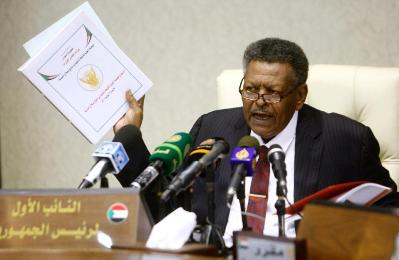Sudanese presidency offers guarantees for rebels participating in the national dialogue
August 3, 2015 (KHARTOUM) – Sudan’s first vice-president, Bakri Hassan Salih, vowed that the government would provide the necessary guarantees to secure the participation of the rebel umbrella, Sudan Revolutionary Forces (SRF) leaders in the national dialogue inside Sudan.

“We will sit with them to discuss the nature of the guarantees which they demand,” he added.
In August 2014, a Sudanese court upheld death sentences in absentia against leaders of the rebel Sudan People Liberation Movement North (SPLM-N), Malik Agar and Yasir Arman in connection with the outbreak of the conflict with Khartoum in the Blue Nile state in September 2011.
Salih said the judicial rulings against Agar and Arman would be automatically dropped if a political agreement was reached.
He stressed the need to build trust among the various political rivals, noting that implementation of the government reform plans requires creation of a conducive political climate.
The vice-president emphasized that the problems in Darfur, South Kordofan and Blue Nile are less difficult than the South Sudanese problem which was resolved in the negotiating table following nine months of talks.
He acknowledged that war has hindered the development process and caused many problems to the country, saying it became an excuse for foreign intervention in Sudan’s internal affairs.
The Sudanese army has been fighting SPLM-N rebels in Blue Nile and South Kordofan since 2011 and a group of armed movements in Darfur since 2003.
POLITICAL AND CIVIL SERVICES REFORM
Salih also pointed the success of the national dialogue would help making other legal and political reforms, adding the outcome of the dialogue could be turned into decisions.
“Several laws needs to be amended and some security and defence legislations need to be reformed,” he added.
He further said the reform program aims to build a state that is based on Shura (consultation) and democracy and able to provide services for its people.
“If the reform program is implemented according to its timetable and mechanisms, it will be a comprehensive one and it will determine the devolution of power [in a manner] that satisfies all parties,” he said.
The vice president pointed that a higher committee would oversee and follow up on the implementation of the reform program, saying that some decisions would be carried out instantly while others will be implemented after introducing additional legislations and laws by June 2016.
He said 33 decrees including 280 items pertaining to the reform process have been issued so far, noting the government pays special attention to the civil service as the basic pillar for reform.
“We want to return the civil services to its glorious past and that needs introduction of [new] legislations and requires us to apply the principles of transparency and fairness with regard to promotions, incentives and accountability,” he added.
Salih pointed to the establishment of the Civil Services Commission (CSC), saying all its work will be computerized in order to ensure the transparency and integrity of the hiring process for government posts.
FOREIGN RELATIONS
Meanwhile, the vice president stressed Sudan’s keenness to deal with the outside world according to its interests and without compromising its sovereignty and independence.
“In our foreign policy we wouldn’t shut the door in the face of anyone except those who refuse [to deal with us],” he said.
He pointed to the recent visits of president Bashir to several Arab nations including Saudi Arabia and the United Arab Emirates (UAE), saying those visits have promoted ties and prospects for cooperation with the Arab countries.
Salih disclosed that Bashir would visit Algeria during the coming period, pointing to the latter’s scheduled visit to Egypt next Friday to participate in the inauguration of the new Suez Canal.
He said that Bashir’s recent visit to South Africa has enhanced the refusal of the African nations to the claims of the International Criminal Court (ICC), describing it as a tool used by colonial powers against the African leaders.
It should be recalled that last June Bashir participated in the 25th African Union summit in Johannesburg defying two ICC arrest warrants against him for war crimes and genocide in Darfur region in March 2009 and July 2010.
(ST)
